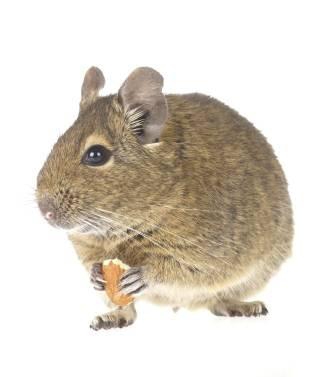Degu
They are slightly vocal animals and make chattering and warbling sounds.The lifespan is between 6-9 years.
CHOOSING AND BUYING YOUR DEGUS
Your degus should be at least 5 weeks old.
A healthy degus should be:
- Bright and alert Have no signs of discharge from eye, ears, mouth and nose
- Have a clean anal area
- Have a glossy coat with no bald patches and no sores on the skin
- Should have orange teeth
- Should have no signs of breathing problems
- Should move around the cage easily with no stiffness or staggering
- Should feel well covered and not bony
HOUSING
In common with other rodents, degus keep their teeth from overgrowing by constant chewing and wooden cages are not ideal. A large aquarium makes a good home provided it has a secure lid and adequate ventilation. Recycled paper makes a good litter and a nest box lined with hay or shredded paper should be provided. The cage should have several different levels, as degus love to climb. The cage should be fitted with a large solid wheel for exercise and plenty of rocks for hiding places. Degus love to carry things around and will appreciate non-plastic toys. Try and buy a selection of toys and rotate them to avoid boredom. Cages must be cleaned regularly but the use of disinfectants and soaps should be avoided. Feeding and Water Degus eat by holding their food in their front paws, but although they will eat almost anything their diet has to be carefully controlled as they are sugar intolerant, which may lead to diabetes. Special pellets are available from your pet shop but degus can be fed on chinchilla or guinea pig pellets as long as they do not contain molasses. The diet should be supplemented with soft hay. Soft fruits, peanuts, sunflower seeds and starchy foods should be avoided. But carrot, turnip and dandelion leaves can be given in small quantities. Fresh clean water must be available at all times and is best provided by a gravity-fed bottle. Handling Degus need to be handled with care. The tail is easily injured and if damaged the animal will nip off the affected part. Degus can shed part of their tail as a defense mechanism. This can pose a serious problem for degus as they use their tails for balance.
GENERAL CARE

Shopping List
- Aquarium with lid or cage
- Hay
- Food
- Food bowl
- Water bottle
- Bottle brush
- Litter
- Bedding
- Nest box
- Toys
- Dust bath and dust
- Book on care of degus
